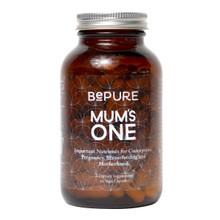
It’s no surprise that mums and mums-to-be (both pregnant and not) need more nutrients when they’re preparing for, or experiencing, motherhood. When we think about the fact that we’re growing a whole human (or more!), we want to give our body all the nutrients it needs to do that job well so that both mum and baby feel good and are as healthy as can be.
This is because the nutrients we do have - from foods and drinks – often don’t meet our full nutrient needs as a result of minerals depleted in our soils. And these nutrient needs only increase when we become pregnant. So, supplementing our nutritional needs wherever possible becomes a priority.
In addition to the more well-known folate and iodine, studies show that the nutrients most commonly lacking in many prenatal diets include vitamin A, B12, B6, zinc, iron, DHA, iodine and choline - all of these are crucial to a baby’s development and growth. There’s a bit of a catch 22 though and that is because these nutrients are largely found in foods that we’re told to limit, or avoid, when pregnant such as fish, shellfish, or organ meats.
A high-quality prenatal vitamin is the ultimate insurance policy for mums-to-be, especially when taken alongside a wholefood, nutrient-dense diet. Meeting our nutritional needs with essential vitamins that our diet can’t support on its own is particularly helpful when one might be avoiding off-putting or out of season foods. So, what do we look for in a prenatal supplement? First of all, we want one that contains all of the key nutrients for pregnancy like:
- Vitamin A
- Folate
- Zinc
- Iron
- DHA
- Iodine
- Choline
When seeking out a quality prenatal multivitamin it’s important to check the forms of nutrients it includes, making sure they're natural, and in forms your body can make itself, or ingest from whole and unprocessed food. You want to ensure it contains high levels of nutrients to support a healthy pregnancy and foetal development.
5 key ingredients to look for and the recommended daily doses:
1. Vitamin A: Vital for both pregnant women and a growing foetus, it’s essential for the sight and eye health of mum and baby as well as development of organs and bones. It is recommended to take 800mcg a day whilst pregnant and 1100mcg a day for breastfeeding women.
2. Folate (B9): Taking folate prior to and during pregnancy can support healthy brain and spinal cord development, 400 micrograms (mcg) a day pre-pregnancy. If breastfeeding, 500 mcg daily to prevent deficiency and support the growth of their healthy infant.
3. Iodine: Essential for the production of maternal and foetal thyroid hormones, which support the healthy development of your baby’s brain and nervous system. It is recommended that pregnant and breastfeeding women take at least 150 mcg of supplemental iodine and top up on iodine-rich foods in their diet.
4. Choline: A lesser-known, but hugely important nutrient, choline, is as important for pregnancy as folate. Choline plays a crucial role in a baby's brain and spinal cord development and supports in the same way as folate. Pregnant women are recommended a minimum of 450 mg of choline per day and breastfeeding mums need a minimum of 500 mg daily.
5. Iron: Did you know that a pregnant woman needs almost double the amount of iron that non-pregnant women do? Roughly 1300 mg of iron is needed in total across the entire duration of pregnancy to support mother and baby, healthy energy levels, and support postpartum. Often pregnant women prefer iron bisglycinate due to its gentleness on the stomach and as a form of iron that doesn’t cause constipation. As if we need any more of that!
Introducing Mum’s One: your essential multivitamin for motherhood
BePure Mum's One
Preconception, pregnancy, postpartum and breastfeeding all require abundant and diverse nutrient stores, which is why Mum’s One was researched and formulated to include crucial pregnancy nutrients: folate, B12, choline, iodine, magnesium, and iron, making it the ultimate pregnancy multi. Designed to support your body and baby when preparing for pregnancy, during pregnancy and keeping you nourished post pregnancy whilst breastfeeding so your body is at its most supported during these crucial years.
|
Holistic tips for new mums
In New Zealand, the expected speed in which a new mum recovers from birth and “gets her body back” is measured in weeks, not months. Women are expected to return to work and normal life after giving birth, as if nothing has happened. New mums go through a lot in their first year of motherhood and often need help to slow down and get support during the postpartum period. While everyone’s journey is unique, this new chapter is all about seeing what works best for you, and finding balance along the way. Here are some tips for how to enhance physical, emotional and mental wellbeing in the first year after giving birth – whether this is your first or fourth baby.
- Eat real food
Focus on nutrient-dense wholefoods and avoid processed and refined foods where possible. Eating well will help support postpartum recovery and nourish breast milk for nursing mums. Postpartum depletion can make new mums feel tired and emotionally wrecked. Aim to include nourishing foods like slow-cooked meats, stews, broths, rice, beans, root vegetables, fresh fruit, seaweed, good fats like avocado and coconut oil to optimise the postpartum healing process and ward off postnatal depletion.
- Rest up and resist the urge to ‘bounce back’
Take all the help you can get in the first year after your baby(s) is born, and don’t feel guilty about it. Use this rule of thumb to help guide your rest postpartum: 1st week – in the bed, 2nd week - around the bed, 3rd week around the house, 4th week around the block. Then it’s baby steps from that point on. Resist the urge to feel like you need to “bounce right back” and carry on as if nothing has changed.
- Ask for help
Involving your partner, family and friends in your journey into new motherhood is an essential part of holistic self-care. All new parents need help and to talk about what they’re going through - no matter what social media tells you. With a new baby in your life, finding time to take care of yourself can become a challenge. I encourage new mums to make time to prioritise their wellbeing and ask for the support they need to do something for themselves - making yourself a priority can be as simple as taking a longer shower or spending time alone with a cup of tea for 15 minutes.
- Move for enjoyment
Exercise raises serotonin levels, our feel good neurotransmitter and is one of nature's best mood boosters. If you feel like you are the only new mum feeling overwhelmed by motherhood - you are not alone. One of the best ways to help shift some of the nervous energy is to move. Exercise does not need to be strenuous postpartum so let go of your pre-baby exercise standards and engage in a type of movement that gets you out of the house and makes you feel good.
Questions I hear most from mums to be and new mums:
1. What is preconception and when should I start preparing?
Known as ‘conscious conception’, preconception care is focused on ensuring anyone planning to conceive has a healthy egg to start with. Ideally, preconception starts 100 days prior to conceiving - the amount of time it takes for an egg to develop, that will one day bond with a sperm to make an embryo. By supporting the body prior to conception we help to increase the quality of the egg, the health of the uterine lining and the corpus luteum - a sponge-like structure that produces the hormones needed to hold a pregnancy during the first trimester.
2. Don’t I just need folate and iodine for the first trimester?
There are a number of key nutrients the body needs pre, during and post-pregnancy to support the development of a healthy baby. A healthy diet is a fantastic foundation, but unfortunately, due to poor food quality and increasing demands and stress on our bodies in modern life, topping up with essential nutrients for pregnancy is crucial. The enormous demand for nutrition during pregnancy makes quality prenatal nutrient supplementation an essential part of a happy and healthy pregnancy journey.
3. What about Omega 3’s, I hear they are helpful?
Omega 3 (EPA and DHA) supplementation during pre, during and post pregnancy has been shown to support healthy neurological and immune development in children. Daily omega-3 supplementation, particularly high concentrations of DHA (one form of omega-3), has specific benefits to support lactation, foetal neuronal development, infant brain function, and heart health.
4. What about probiotics for pregnancy?
The maternal gut microbiome has a significant impact on infant microbiome and health. In fact, the first microbes that colonise an infant's gut come from a mother's vaginal microflora during delivery. After this initial inoculation, breast milk continues to provide the infant microbiome with a constant supply of both pre and probiotics aiding the development of good gut health and a robust immune system. Research shows that, when taken pre, during and post pregnancy, probiotics can support the way infants respond to allergens and support with behavioural conditions.
Looking for other support for your journey to motherhood?
|
Always read the label and use as directed. Supplementary to a balanced diet.
BePure Health Limited Auckland.


